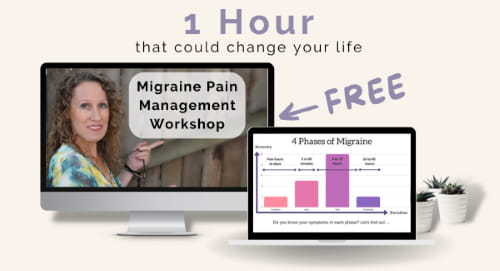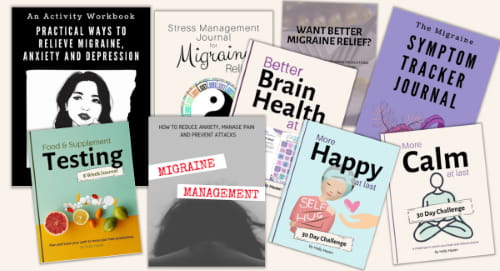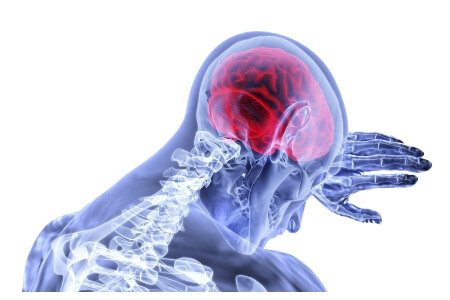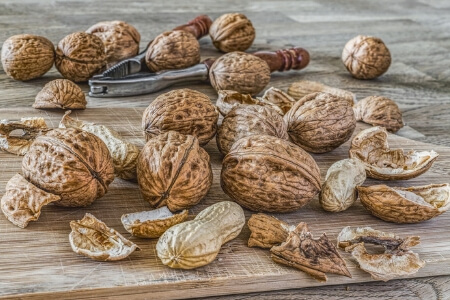- Home
- Migraine Education
- Migraine Brain Vs Normal Brain
Migraine Brain vs Normal Brain: How Pain Works in the Migraine Brain
The migraine brain vs normal brain. Did you know that we all have a pain feedback loop? The brain learns how to keep it going!
This Q & A is a summary of my 'study notes' from an interview done with Patricia Pozo Rosich, MD, PhD during the 2020 Migraine World Summit. I can't stress enough how important it is to watch some of the summit this year if you can. Here's the link to get on their list and stay up to date - The Migraine World Summit
How Pain Works in the Migraine Brain, Patricia Pozo Rosich, MD, PhD
These were some of the key questions that were asked:
Does pain provide any benefit to those of us living with chronic migraine?
No. No benefit at all.
What is the difference between acute or episodic pain and chronic pain?
Normal pain is typically a warning sign that something is wrong. Our alert system to tell our body something is wrong.
When it turns chronic – you train your brain to deal with it daily – and it learns how to live that way. Instead of living without pain!
Migraine pain is not a warning sign.
Pain is to help defend us from things. People who don’t feel pain – die. It doesn’t help you to survive.
She says there is probably something else too if you have 15-20 days of migraine each month – perhaps the others are not migraine - the brain lives through this feeling of pain. She mentions phantom limb syndrome – where the person can still feel pain in an arm that is not there.
Pain is very tricky. It is our defence mechanism and she thinks it can start before a problem.
Sometimes – you don’t want to do something and suddenly a migraine starts. This means the brain is trying to protect you - to warn you – this is not the way to go.
Chronic pain is very complex.
It takes a multidisciplinary approach and probably more than one drug.
Why do some people experience pain more acutely? Do men and women register pain differently?
Fibromyalgia, Chronic fatigue syndrome, and migraine - more women than men are effected.
Dr. Doucer in the US did a study in rats! Female rats, when injected in the dura (what covers the pain – brain is not sensitive to pain – but the dura is) with GCRP exhibited pain like behaviors. The male rats did not.
There’s something in the response to CGRP in female rates. It's more complex for us as humans obviously – but we see part of the reason why migraine occurs more often in the reproductive period of life.
How does pain change the brain?
A functional MRI (fMRI) shows the brain changes – in constant change - and its activated circuits.
If it can’t activate something it forms a plan B, or plan C!
It has to get where it wants to – the best way of getting there.
And fMRI changes with acute pain are seen in imaging. They are starting to see changes in chronic migraine. Some changes in chronic migraine – some are dynamic – which means they can change with treatment – and some aren’t.
A study showed permanent lesions in the migraine brain do not go away with treatment – say Botox. Lesions do not have to give you symptoms. The sooner the better – treat it.
Is pain detected in brain imaging?
fMRI – pain is invisible – but you can see parts of the brain that activate itself during pain. Brain controls emotions, location, response emotional in regards to motor responses. The best plan for an attack is to get into a dark room.
What happens when a pain cycle is activated?
One event = acute moment. No cycle is formed.
Pain in migraine 2-3 days – creates inflammation in the dura – usually lasts 2-3 days – that’s the time the body needs to recover from an inflammatory event.
The fear of having the next attack – lowers the threshold to create the next attack.
Through repetition – our biology – is taught to respond to repetition – if you have an attack every day at the end of the day your brain doesn’t need much more to remind it to have an attack.
It can form a negative cycle into having more and more pain,
The sooner you stop the vicious cycle the better.
After one year - response to preventative treatment is worse. Quick responders need to act fast. How much time you’ve been with pain – the new antibodies seem to work a little faster. Episodic migraine has better results than chronic migraine.
Certain patients – have always acute episodic attacks – who will not chronify.
Very chronic 20 days seem to be stable. There are others mid range – episodic – go up and down very quickly from 7 – 10.
The system is trying to correct the pain cycle – something to correct the problem – but they don’t understand it yet.
Is there any evidence that chronic migraine is associated with premature aging of the brain?
There is a belief that patients STOP having migraines after menopause. 40 years ago they said this that it would stop and that the migraines would improve – but some people don’t have that happen.
We live longer now. People retired at 65 because you died at 66! BUT people are living longer – women live many years! Chronic pain doesn’t always disappear for these old women.
And in some people – it is a new pain.
She sees 6,000 patients a year. She feels migraineurs are not seeing premature aging in the brain and getting Alzheimer’s. (YAY!)
But she also said we need to do more research in the elderly to substantiate this.
What are some ways of dealing with chronic pain?
It’s a bit of everything – 4 big pillars – things that make a change:
#1. Education is key.
#2. Choose the right medication for them – preventive or acute. In regard to prevention you must treat the main problem - and take into consideration comorbidities. **Sleep** make sure people really are able to sleep well and have a good mood too. If very anxious or depressed this may influence their perception of the treatment, how they’re feeling and their perception of pain.
#3. It is a neurovascular disorder – think about the vessels – hypertension – try to stabilize blood pressure. Preventive treatment is focused.
#4. Acute treatment – avoid opiates – know when the right time with which drugs is, and what the options are if it doesn’t work. And that you have to give them resources.
Physicians are taught to treat acute pain, not chronic pain. She teaches – prevention and then acute comes last.
She sees that this is where her patients focus their attention but all the rest is SO important. If the prevention is right, the idea is not to have acute attacks.
8/10 people living with migraine DO NOT take the correct medication - is this related?
We know that people don’t do things right mostly because they just don’t know how to do them right. This could be from a lack of interest from physicians.
She sees patients that have taken numerous medications with very poor results making the whole period longer.
Opioids – in US – are a pandemic. Tramadol – mild opiate – addictive – threshold gets worse. Ibuprofen can affect kidneys so doctors are afraid to use these.
Cannabis? It’s a sexy receptor – many people are working on this – but the evidence is showing it doesn’t help in the right way – but it does help anxiety. [2]
How is migraine pain correlated with other pain conditions a patient may have?
My back pain gets worse when I have a migraine! For example, they are not directly related. But once the migraine activates the pain circuit in the brain – it activates the pain circuit of other pains as well. But, when a chronic migraine pain responds to treatment – it only responds to migraine. The lower back pain can remain.
The future is about precision medicine and finding subgroups of people that respond to certain things or not, and not be so generalist.
Do you think migraine can be a precursor to other pain conditions like allodynia or central sensitization?
Chronic migraine – yes, but not migraine in general.
Vascular – so it could be precursor of a stroke or other things that are there.
One chronic condition can create inflammation – hence causes / potentiates other conditions.
How we can improve our quality of life whilst still dealing with the pain?
What are the ingredients that make pain chronic? The migraine brain vs normal brain keeps the pain feedback loop going. But there are ways we can help it stop.
First
Make pain your friend – do not fight it.
Form a strategy. (Watch the movie RBG - Ruth Ginsberg in supreme court justice).
Don’t create a lot of energy around why are you here? Don't let your thoughts spiral into that and cause more unhelpful emotions. Both migraine brain vs normal brain can do that.
Migraine brain vs normal brain - both have the negativity bias.
Second
Get the right help – follow your instincts. If you are not happy with your doctor – find another one.
And don’t give up. EVER.
Third
Chronic pain starts after a big time of stress in your life. The chronic part is – if you haven’t realized why that happened – or not come to terms with it – cause or consequence. There is less, as doctors, we can do to help.
Ask yourself "why did the pain chronify in my life?" You will likely discover that you had no resources to deal with the big thing / stress. And you do now... there are loads of resources here.
Earlier intervention can change the shape of your life.
~ Patricia Pozo Rosich, MD, PhD
WATCH >> THE MIGRAINE WORLD SUMMIT << FOR THE LATEST RESEARCH & PRACTICAL TIPS
Ready to take the next step?
Choose the next step that fits where you are right now.
MIGRAINE EDUCATION Related Articles
Migraine Brain vs Normal Brain Reference:
1. The 2020 Migraine World Summit
2. Patricia Pozo Rosich, MD, PhD (2016) Eight out of ten migraine sufferers do not use the correct medication. Available [online] at: https://www.lavanguardia.com/vida/20160912/41255425336/ocho-de-cada-diez-pacientes-con-migrana-no-utilizan-una-medicacion-correcta.html
Migraine brain vs normal brain posted on Feb. 9, 2021 updated Mar. 5, 2023; Jan. 2024.
Comments On Migraine Brain vs Normal Brain
Migraine Brain vs Normal Brain Chat by Anna (Victoria)
I just wanted to say thankyou for posting this article and for chatting with me via email. You helped me find some much needed resources.
To share comments about this page please use my contact form. Please enter your title and add this page ref: [Migraine Brain vs Normal Brain].














